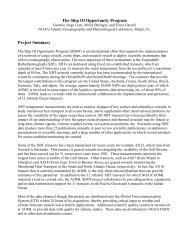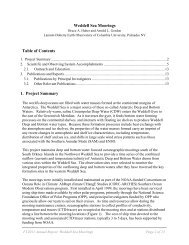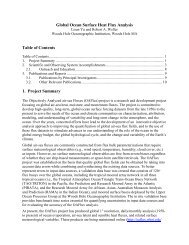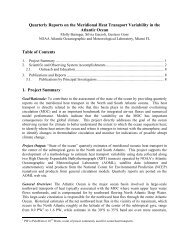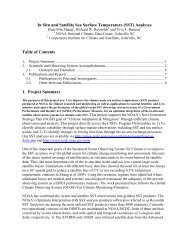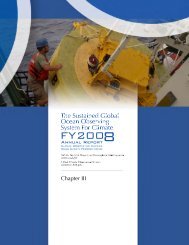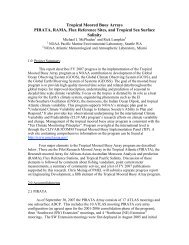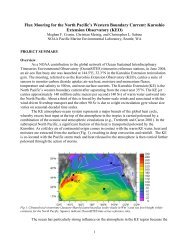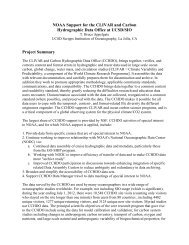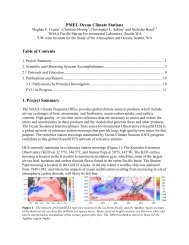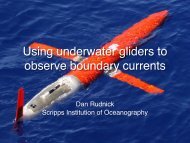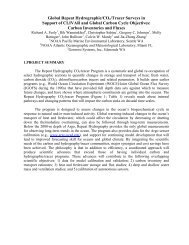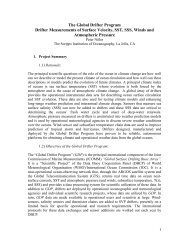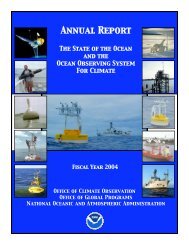GCOS Implementation Plan - WMO
GCOS Implementation Plan - WMO
GCOS Implementation Plan - WMO
Create successful ePaper yourself
Turn your PDF publications into a flip-book with our unique Google optimized e-Paper software.
<strong>Implementation</strong> <strong>Plan</strong> for the Global Observing System for Climate in Support of the UNFCCC<br />
(2010 Update)<br />
The outputs of the reanalysis programme will have wide use and should be made easily available to<br />
the user community. This includes estimates of the quality of both the resulting analyses and the data<br />
used. Although reanalysis can enable value to be derived from a wide range of comprehensive data<br />
sources, a climate-quality reanalysis is best when the data sources include a significant fraction of<br />
data adhering to the GCMPs. The identified <strong>GCOS</strong> networks in the atmosphere and the networks of<br />
drifting buoys and sub-surface floats in the ocean are critical in this respect. Making national holdings<br />
of historical data available to the International Data Centres is an essential requirement for the<br />
effective conduct of reanalysis. Continued development of the datasets for reanalyses, such as within<br />
the Atmospheric Circulation Reconstructions over the Earth (ACRE) collaborative initiative, should<br />
also be part of an ongoing activity<br />
The <strong>GCOS</strong> Steering Committee, Panels and Secretariat will work with the respective technical<br />
commissions and international research programmes to foster coordinated production by the<br />
reanalysis centres. In addition, the <strong>GCOS</strong>/GTOS/WCRP Terrestrial Observation Panel for Climate<br />
(TOPC) and the <strong>GCOS</strong>/GOOS/WCRP Ocean Observations Panel for Climate (OOPC) will continue to<br />
encourage continuation of pilot projects and associated research on ocean and terrestrial data<br />
assimilation. Finally, the International Data Centres, including the World Data Centres (WDCs), should<br />
continue to work with the responsible technical commissions and research programmes to ensure the<br />
provision of historical datasets including metadata to internationally-mandated archives for inclusion in<br />
reanalysis programmes. The Joint Steering Committee for the WCRP and the <strong>GCOS</strong> Steering<br />
Committee (through the WCRP/<strong>GCOS</strong> Observations and Assimilation Panel (WOAP) and the<br />
<strong>GCOS</strong>/WCRP Atmospheric Observation Panel for Climate (AOPC)) have jointly established a working<br />
group to enable exactly this task for atmospheric data (cf. Appendix 5).<br />
Action C10 [IP-04 C11]<br />
Action: Prepare the atmospheric, oceanic, terrestrial and cryospheric datasets and metadata,<br />
including historic data records, for climate analyses and reanalyses.<br />
Who: Parties with Data Centres (e.g., WDCs), working together with technical commissions and the<br />
scientific community, especially the joint WOAP/AOPC Working Group on Observational Datasets<br />
for Reanalysis and the ACRE collaborative initiative.<br />
Time-Frame: Now and ongoing.<br />
Performance Indicator: New or improved datasets available for analysis or reanalysis.<br />
Annual Cost Implications: Covered in domains.<br />
Action C11 [IP-04 C12]<br />
Action: Establish sustainable systems for the routine and regular analysis of the ECVs, as<br />
appropriate and feasible, including measures of uncertainty.<br />
Who: Parties sponsoring internationally-designated analysis activities, with guidance from WCRP,<br />
IGBP and IPCC.<br />
Time-Frame: Now and ongoing<br />
Performance Indicator: Quality and range of analyses of the ECVs.<br />
Annual Cost Implications: Covered in domains.<br />
Action C12 [IP-04 C13]<br />
Action: Establish a sustained capacity for global climate reanalysis and ensure coordination and<br />
collaboration among reanalysis centres.<br />
Who: National and international agencies.<br />
Time-Frame: Continue ongoing activity but with climate trends better addressed by 2014, and<br />
expansion into coupled reanalysis by 2016.<br />
Performance Indicator: Reanalysis centres endowed with long-term and coordinated programmes;<br />
cyclical flow of products of improving quality and widening range.<br />
Annual Cost Implications: 10-30M (Mainly Annex-I Parties)<br />
3.6. Early Instrumental Data and Proxy Reconstructions of Past Climates<br />
This <strong>Plan</strong> focuses primarily on the need to improve ongoing observation of climate variables.<br />
However, there is a need to extend these records backwards in time, both for analysis and reanalysis<br />
purposes. Analysis of past variations and changes in climate is an essential part of interpreting<br />
current records of climate. The existence of long records allows:<br />
37



